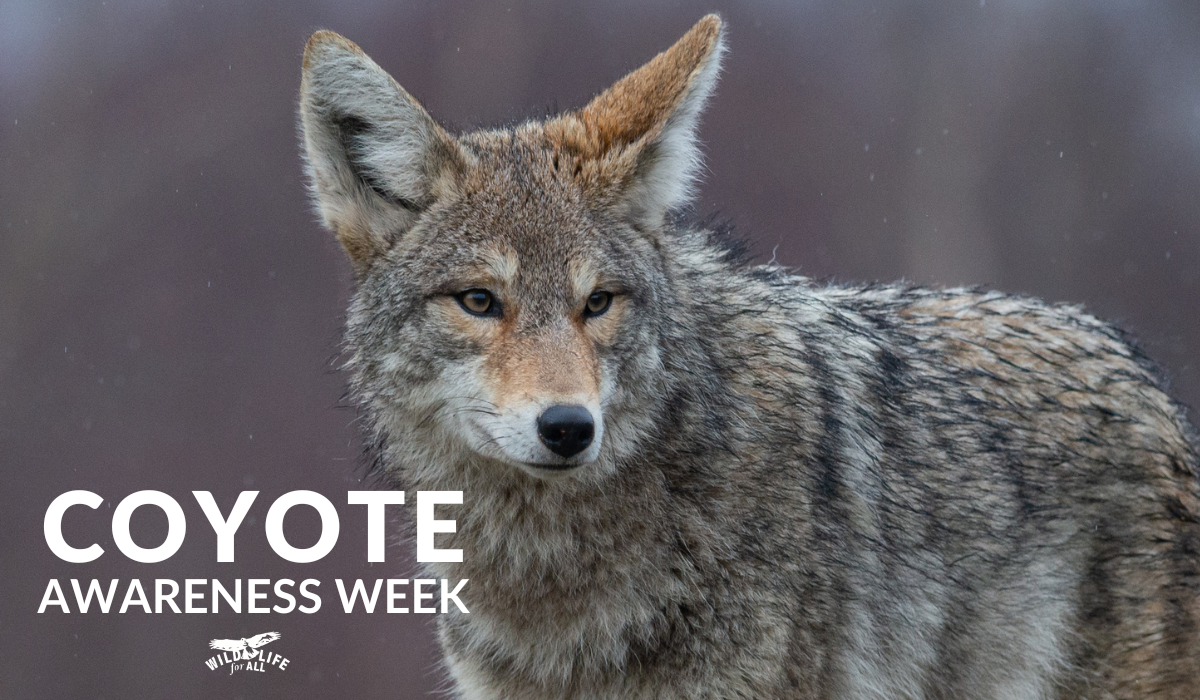
Coyote Awareness Week: Challenging Fear, Embracing Coexistence
Coyotes are one of the most persecuted wild animals in North America. Despite their intelligence, adaptability, and crucial ecological roles, they are subject to relentless killing—over half a million coyotes die each year in the U.S. alone. This staggering number, more than one coyote killed per minute, is fueled by outdated myths, fear-driven policies, and a deeply ingrained war against predators that dates back to European colonization.
Predator extermination campaigns in the 1800s–mid 1900s nearly wiped wolves, mountain lions, and bears off the map. But when the focus turned to coyotes, they responded to this persecution with resilience and adaptability, tripling their range in the last century and filling vacant niches left where wolves were extirpated. Yet rather than celebrating their resilience to adapt to a human dominated world and the important roles they play in our urban and rural communities, our society has often labeled the coyote as a “pest” or a threat to human communities.
Unlike other carnivores, coyotes have virtually no protections under state wildlife laws, allowing unlimited, year-round killing by almost any means, including trapping, poisoning, aerial gunning, and in wildlife killing contests. Federal agencies like USDA Wildlife Services further enable this persecution, killing nearly 70,000 coyotes annually, mostly at the request of the livestock industry.
Coyote’s ability to adjust to changing conditions and diverse environments, along with their ability to survive and thrive in the face of relentless persecution, has left them vulnerable to insufficient legal protections. In almost every region of the United States, coyotes are legally allowed to be killed, sometimes incentivized through bounties, in unlimited numbers 365 days of the year, using almost any means, including killing contests, trapping, poisoning, hounding, baiting, aerial gunning, and unregulated recreational killing.
Accurate numbers do not exist for how many coyotes are killed through “sport” or wildlife killing contests, because state agencies often do not track or monitor the killing of coyotes, and this number is likely a very low estimate. Even with this underestimate, it translates to: 41,666 coyotes killed every month; 9,615 coyotes killed every week; 1,370 coyotes killed every day, 57 coyotes killed every hour; and 1 coyote killed every minute.
But the science is clear: killing coyotes doesn’t solve conflicts—and sometimes, it can actually make them worse. Disrupting coyote family structures leads to more breeding by younger animals, larger litters, and potentially increased conflicts with livestock from younger animals who don’t know how to target proper prey. Instead of lethal “management” that has been proven ineffective, we need policies that promote coexistence, respect, and sound ecological principles.
Coyotes play a vital role in maintaining healthy ecosystems. They regulate rodent populations, limit disease transmission, and control mesocarnivores like skunks and raccoons, which helps increase bird diversity. Whether in rural landscapes or urban neighborhoods, they provide essential ecosystem services that benefit us all. Yet, instead of recognizing their value, our society has labeled them as pests, subjecting them to brutal and indiscriminate killing methods—including trapping, poisoning, aerial gunning, hounding, and wildlife killing contests.
Coyote Awareness Week, created by Project Coyote, is a call to rethink our relationship with these intelligent, resilient animals. By understanding coyote behavior, reducing human-caused attractants, and using humane hazing techniques when needed, we can foster coexistence instead of conflict. This week is centered on teaching communities nationwide about coyote ecology, behavior, and compassionate coexistence. We believe that if we can change hearts and minds about coyotes, the world will be a more compassionate place for all wild lives.
Wildlife for All is proudly signing the Coyote Pledge to:
- Recognize the Importance of Coyotes: Take responsibility to learn about the critical role coyotes serve in our ecosystems, helping to maintain biodiversity and healthy environments.
- Dispel Myths and Misconceptions: Share accurate information about coyotes in your community (in-person and on social media) to address common myths to promote understanding and reduce fear.
- Support Community Coexistence Efforts: Learn how to keep coyotes wild through humane hazing and reduce attractants that can lead to habituation in your yard and community. Together we can positively manage interactions between humans and coyotes in urban, suburban, and rural areas.
- Educate and Inspire Action: Use Coyote Awareness Week to educate your community about the benefits of living alongside coyotes by sharing Coyote Awareness Week emails and social media posts or creating your own.
- Advocate for Ethical and Science-based Wildlife Policies: Support policies in your state and at the federal level that protect coyotes and oppose inhumane practices like indiscriminate trapping, wildlife killing contests, and hounding.
Coyotes have been here since the Pleistocene, adapting to human expansion with remarkable resilience. It’s time to end the war on coyotes and advocate for policies that reflect science, ethics, and public values. Let’s build a future where coyotes—and all wildlife—are treated with the respect they deserve.
